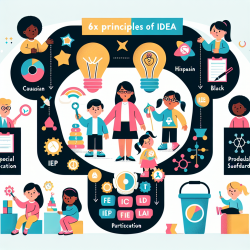The Individuals with Disabilities Education Act (IDEA) is a cornerstone of special education in the United States. Understanding its six guiding principles can help parents, educators, and administrators ensure that every student receives the support they need to thrive. Let's dive into these principles and explore what they mean for our schools and communities.
1. Free and Appropriate Public Education (FAPE)
Every child with a disability is entitled to a free and appropriate public education. This means that schools must provide individualized instruction and services at no cost to the parents. The goal is to prepare students for further education, employment, and independent living.
2. Appropriate Evaluation
Before a child can receive special education services, they must be properly evaluated. This evaluation must be conducted by a team of professionals and must use a variety of assessment tools and strategies. The aim is to identify the child's unique needs and to determine whether they qualify for special education services.
3. Individualized Education Program (IEP)
An IEP is a written plan that outlines the specific educational goals and services for a child with a disability. It is developed by a team that includes the child's parents, teachers, and other specialists. The IEP must be reviewed and updated annually to ensure it meets the child's evolving needs.
4. Least Restrictive Environment (LRE)
Children with disabilities should be educated in the least restrictive environment that is appropriate for them. This means they should spend as much time as possible with their non-disabled peers. The goal is to promote inclusion and prevent unnecessary segregation.
5. Parent and Student Participation in Decision Making
Parents and students have the right to be involved in all decisions regarding the child's education. This includes participating in IEP meetings, providing input on educational goals, and being informed of any changes to the child's services. Active participation helps ensure that the child's needs are met.
6. Procedural Safeguards
Procedural safeguards are designed to protect the rights of children with disabilities and their families. These include the right to be informed of their rights, the right to consent or decline services, and the right to resolve disputes through mediation or due process hearings.
By understanding these six principles, we can better support our students and create a more inclusive educational environment. For more information, please follow this link.










